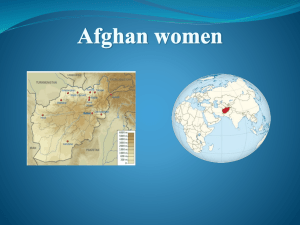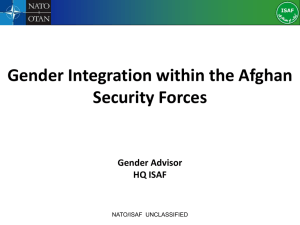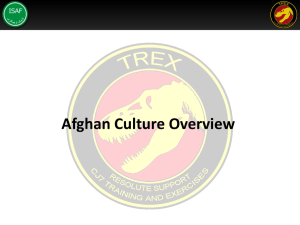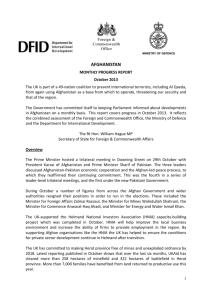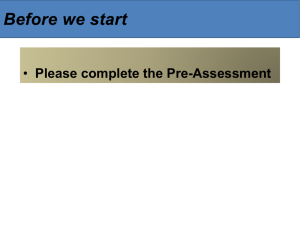Center Input for OCHA on UNAMA Renewal
advertisement
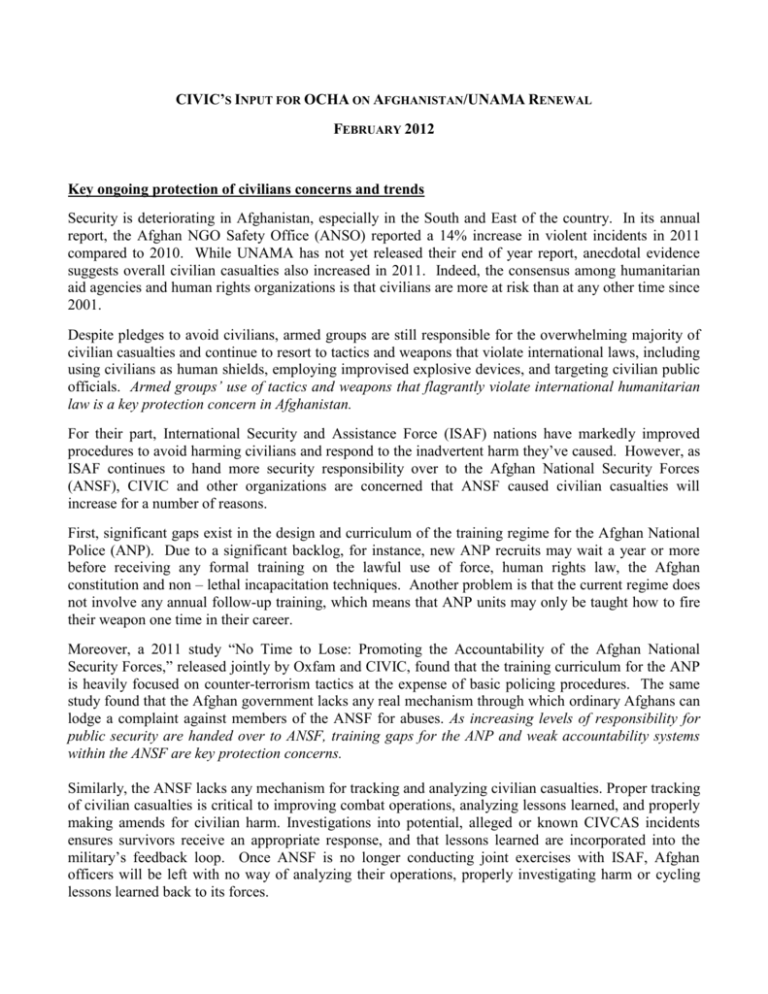
CIVIC’S INPUT FOR OCHA ON AFGHANISTAN/UNAMA RENEWAL FEBRUARY 2012 Key ongoing protection of civilians concerns and trends Security is deteriorating in Afghanistan, especially in the South and East of the country. In its annual report, the Afghan NGO Safety Office (ANSO) reported a 14% increase in violent incidents in 2011 compared to 2010. While UNAMA has not yet released their end of year report, anecdotal evidence suggests overall civilian casualties also increased in 2011. Indeed, the consensus among humanitarian aid agencies and human rights organizations is that civilians are more at risk than at any other time since 2001. Despite pledges to avoid civilians, armed groups are still responsible for the overwhelming majority of civilian casualties and continue to resort to tactics and weapons that violate international laws, including using civilians as human shields, employing improvised explosive devices, and targeting civilian public officials. Armed groups’ use of tactics and weapons that flagrantly violate international humanitarian law is a key protection concern in Afghanistan. For their part, International Security and Assistance Force (ISAF) nations have markedly improved procedures to avoid harming civilians and respond to the inadvertent harm they’ve caused. However, as ISAF continues to hand more security responsibility over to the Afghan National Security Forces (ANSF), CIVIC and other organizations are concerned that ANSF caused civilian casualties will increase for a number of reasons. First, significant gaps exist in the design and curriculum of the training regime for the Afghan National Police (ANP). Due to a significant backlog, for instance, new ANP recruits may wait a year or more before receiving any formal training on the lawful use of force, human rights law, the Afghan constitution and non – lethal incapacitation techniques. Another problem is that the current regime does not involve any annual follow-up training, which means that ANP units may only be taught how to fire their weapon one time in their career. Moreover, a 2011 study “No Time to Lose: Promoting the Accountability of the Afghan National Security Forces,” released jointly by Oxfam and CIVIC, found that the training curriculum for the ANP is heavily focused on counter-terrorism tactics at the expense of basic policing procedures. The same study found that the Afghan government lacks any real mechanism through which ordinary Afghans can lodge a complaint against members of the ANSF for abuses. As increasing levels of responsibility for public security are handed over to ANSF, training gaps for the ANP and weak accountability systems within the ANSF are key protection concerns. Similarly, the ANSF lacks any mechanism for tracking and analyzing civilian casualties. Proper tracking of civilian casualties is critical to improving combat operations, analyzing lessons learned, and properly making amends for civilian harm. Investigations into potential, alleged or known CIVCAS incidents ensures survivors receive an appropriate response, and that lessons learned are incorporated into the military’s feedback loop. Once ANSF is no longer conducting joint exercises with ISAF, Afghan officers will be left with no way of analyzing their operations, properly investigating harm or cycling lessons learned back to its forces. Finally, CIVIC is concerned that Afghan Forces currently have no system of recognizing or offering assistance to those harmed by its combat operations. The act of making amends is obviously important in the culture, given that President Karzai has his own fund to help terror victims and other help through ministries is available to the disabled. The lack of any capacity within the ANSF for tracking, analyzing and making amends to those killed or injured during Afghan led operations is another key protection concern, as it means that many of the civilian harm mitigation lessons ISAF learned in Afghanistan will be lost once international military forces depart in 2014. Current steps to address concerns and remaining gaps in enhancing civilian protection Since 2009, ISAF has taken a number of positive steps to prevent and mitigate civilian casualties, including: creating a civilian casualty tracking cell now called the Civilian Casualty Mitigation Team (CCMT); establishing a casualty mitigation working group; passing guidelines for amends (in the form of ex-gratia compensation) by the North Atlantic Council (NAC); and issuing tactical directives specifically focused on reducing civilian casualties caused by airpower. CIVIC commends these efforts, in addition to General Allen’s (COMISAF) 2011 undertaking of a strategic review of all “CIVCAS” procedures. As a result of these steps, ISAF-caused civilian casualties continue to decline, and represent less than ten percent of overall civilian casualties in Afghanistan. CIVIC is currently urging ISAF to implement the following advocacy priorities: Press the Afghan Government to create a mirror system of amends. NATO should be pressing the Afghan Government, including through the Ministry of Defense, to set up a proper mechanism to recognize civilian war victims, offer explanations for their losses and, importantly, pay compensation for inadvertent harm. Violations of international and domestic law must have their own accountability mechanisms to ensure justice and full redress for victims. Press the Afghan Government to create a mirror system of data tracking and investigatory capacity. Afghan Forces currently have no system of CIVCAS data collection or proper investigatory teams. Once ANSF is no longer conducting joint exercises with ISAF, Afghan officers will be left with no way of analyzing their operations, properly investigating harm or cycling lessons learned back to its forces. NATO should be pressing the Afghan Government, including through the Ministry of Defense, to set up the proper mechanisms. Train the ANSF on civilian harm mitigation and consequence management. ANSF commanders frequently note that they will not cause civilian harm when they are in the driver’s seat. This is a dangerous mindset. As ISAF mentors its Afghan partners, civilian protection procedures and thinking must be just as important as reading, writing and weaponry. IHL, data tracking, proper investigations and ways to recognize and respect civilians harmed in conflict should be standard in all curriculum promoted by the NTM-A (it is currently is not) and should include ISAF lessons learned. The success or failure of this effort will reflect on NATO’s mentoring mandate. Suggestions for possible UN Security Council action to respond to these concerns In SC RES 1974 (2011), the Security Council recognized “the progress made by ISAF and other international forces in minimizing the risk of civilian casualties” and called on them to “continue to take robust efforts in this regard, notably by the continuous review of tactics and procedures and the conduct of after – action reviews and investigations in cooperation with the Afghan government” (Para 20). CIVIC urges the Security Council to call attention to the need for the Afghan government to create a mirror system of data tracking and investigatory capacity as discussed above, and urge ISAF nations to prevail upon their counterparts in the ANSF in this regard. In SC RES 1974 (2011), the Security Council reiterated the importance of increasing the “professionalism and accountability” of the Afghan Security Sector. As discussed above, serious problems and gaps exist regarding the training and accountability of the ANSF. With less than three years until ISAF forces depart, the Security Council should prioritize security sector reform and work with the Afghan government to ensure the creation of robust accountability mechanisms within the ANSF.
